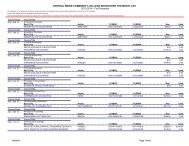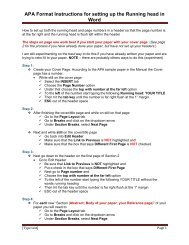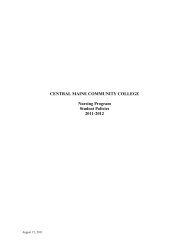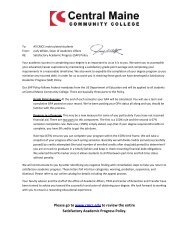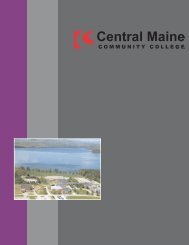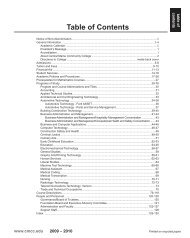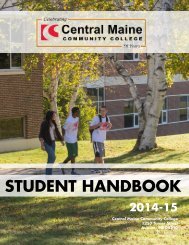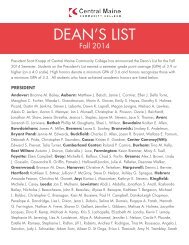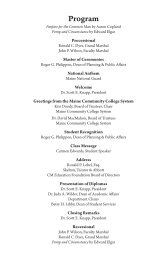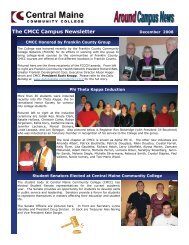Academic Policies and Procedures - Central Maine Community ...
Academic Policies and Procedures - Central Maine Community ...
Academic Policies and Procedures - Central Maine Community ...
You also want an ePaper? Increase the reach of your titles
YUMPU automatically turns print PDFs into web optimized ePapers that Google loves.
course<br />
descriptions<br />
Course Descriptions<br />
POS 160 Introduction to International<br />
Relations<br />
3 Credits (3 Lecture 0 Lab 0 Shop)<br />
3 Hrs/Wk (3 Hrs. Lecture) *15 wks<br />
This introductory course is about the theo ry <strong>and</strong><br />
contemporary history of global poli tics from an<br />
international relations perspective. Subjects include:<br />
the nature of personal leadership, the environment,<br />
power <strong>and</strong> decision making; causes<br />
of ter rorism, war, peace, <strong>and</strong> relations between<br />
national security <strong>and</strong> domestic political sta bility;<br />
economic development <strong>and</strong> trade management,<br />
technology <strong>and</strong> the global revolution in communications<br />
<strong>and</strong> interde pendence <strong>and</strong> ethnic <strong>and</strong><br />
religious identi ties in regional <strong>and</strong> global politics.<br />
POS 170 Sports <strong>and</strong> Politics<br />
3 Credits (3 Lecture 0 Lab 0 Shop)<br />
3 Hrs/Wk (3 Hrs. Lecture) *15 wks<br />
This course will introduce the student to the<br />
relationships between sports <strong>and</strong> politics in the<br />
contemporary world. In particular, the course will<br />
analyze how politics <strong>and</strong> laws affect the structure<br />
<strong>and</strong> outcomes of sports <strong>and</strong> how sports<br />
affect the structure <strong>and</strong> con tent of politics <strong>and</strong><br />
laws. Specifi cally, the course will focus on the<br />
following themes: civil rights <strong>and</strong> sports, the<br />
legal <strong>and</strong> fi scal environment of sports, federal<br />
<strong>and</strong> state <strong>and</strong> local government regulations of<br />
sports, com mercialism in sports <strong>and</strong> the globalization<br />
of sports. Both amateur <strong>and</strong> professional<br />
sports will be analyzed. The following specific<br />
sports <strong>and</strong> sporting events will be ana lyzed: the<br />
Olympics, baseball, soccer, hockey, <strong>and</strong> snowmobiling.<br />
In a more gener al way, football <strong>and</strong><br />
basketball will also be analyzed. Within these,<br />
the following issues will be analyzed: the legal<br />
environment of competition <strong>and</strong> antitrust law,<br />
the responsibil ity <strong>and</strong> rights of owners, player<br />
associations <strong>and</strong> fans, the collective bargaining<br />
process, drugs <strong>and</strong> sports, gender equality <strong>and</strong><br />
law, international politics <strong>and</strong> amateur sports<br />
<strong>and</strong> safety <strong>and</strong> regulation of sports. There may<br />
be some field trips to sporting events.<br />
POS 201 <strong>Maine</strong> State Government<br />
3 Credits (3 Lecture 0 Lab 0 Shop)<br />
3 Hrs/Wk (3 Hrs. Lecture) *15 wks<br />
An overview of the governing process in <strong>Maine</strong><br />
<strong>and</strong> how citizens participate in their government.<br />
The local <strong>and</strong> state process es will be discussed<br />
in this course.<br />
POS 205 Introduction to Comparative Politics<br />
3 Credits (3 Lecture 0 Lab 0 Shop)<br />
3 Hrs/Wk (3 Hrs. Lecture) *15 wks<br />
This course offers a broad, comparative introduction<br />
to the structure <strong>and</strong> function of national<br />
political systems, with an emphasis on the<br />
structural <strong>and</strong> function attributes that distinguish<br />
democracies from non-democracies, <strong>and</strong> that<br />
distinguish different types of democracies <strong>and</strong><br />
nondemocracies from each other. Additional<br />
substantive areas to be analyzed include the<br />
global environment, the social sources of power,<br />
the economic sources of power, dem<strong>and</strong>, support<br />
<strong>and</strong> decision-making, system maintenance,<br />
force <strong>and</strong> military intervention <strong>and</strong> violence <strong>and</strong><br />
political change.<br />
POS 296 Special Topics in Political Science<br />
3 Credits (3 Lecture 0 Lab 0 Shop)<br />
3 Hrs/Wk (3 Hrs. Lecture) *15 wks<br />
The students in this course will analyze selected<br />
topics in political science. These topics will<br />
analyze various controversies in contemporary<br />
political science. The topics may be found in<br />
the political institutions, social institutions <strong>and</strong><br />
public policy of selected countries. The special<br />
topic ana lyzed is not a regular course offering of<br />
the Social Sciences department. Since the topic<br />
covered in this class differs from year to year,<br />
students should seek further infor mation from<br />
the instructor before register ing regarding the<br />
particular topic that will be analyzed. Possible<br />
topics to be analyzed include: US presidential<br />
elections, civil lib erties, terrorism, technology<br />
<strong>and</strong> politics <strong>and</strong> political participation.<br />
Precision Machining Technology<br />
(PMT)<br />
PMT 103 Print Reading <strong>and</strong> Sketching<br />
3 Credits (3 Lecture 0 Lab 0 Shop)<br />
3 Hrs/Week (3 Hrs. Lecture)<br />
This course is designed to teach the fundamentals<br />
of print reading <strong>and</strong> sketching.<br />
Throughout the course assignments stu dents<br />
will adhere to current ASME or ANSI st<strong>and</strong>ards.<br />
The students will be taught the basics of orthographic<br />
projection, pictorial sketching, <strong>and</strong> print<br />
reading through a combination of sketching <strong>and</strong><br />
textbook assignments.<br />
PMT 111 Introduction to Lathes<br />
2 Credits (.5 Lecture 1 Lab .5 Shop)<br />
4 Hrs/Wk (.5 Hr. Lecture 2 Hrs. Lab 1.5 Hrs.<br />
Shop) *15 wks<br />
This course is designed to familiarize the student<br />
with the lathe <strong>and</strong> its functions. Each student<br />
will be taught safety precau tions, setup <strong>and</strong><br />
operating procedures for facing, turning, drilling<br />
<strong>and</strong> boring. Tool geometry <strong>and</strong> the use of measuring<br />
tools related to the lathe operations will<br />
also be covered.<br />
PMT 115 Introduction to Computer<br />
Numerical Control<br />
2 Credits (.5 Lecture 1 Lab .5 Shop)<br />
4 Hrs/Wk (.5 Hr. Lecture 2 Hrs. Lab 1.5 Hrs.<br />
Shop) *15 wks<br />
This course is the foundation of computer numerical<br />
control, which includes G codes, M<br />
codes, <strong>and</strong> the study of a glossary of terms<br />
related to CNC. Students will learn programming<br />
basics that include but are not limited to<br />
linear moves, circular moves, rapids, contours,<br />
slots, drilling, threading, chamfers, <strong>and</strong> canned<br />
cycles. The student will write two machining<br />
center <strong>and</strong> two lathe programs using manual<br />
programming. These programs will be run by<br />
the students when they take PMT 124 Applied<br />
Computer Numerical Control in the second semester.<br />
Prerequisite: PMT 111, 116, <strong>and</strong> 117 or<br />
instructor permission.<br />
PMT 116 Milling & Grinding<br />
2 Credits (.5 Lecture 1 Lab .5 Shop)<br />
4 Hrs/Wk (.5 Hr. Lecture 2 Hrs. Lab 1.5 Hrs.<br />
Shop) *15 wks<br />
This course will introduce the student to the set<br />
up <strong>and</strong> operation of vertical milling machines<br />
<strong>and</strong> surface grinders. Calculation of milling machine<br />
feeds <strong>and</strong> speeds. Instruction on grinding<br />
wheel selection, ring testing, <strong>and</strong> proper wheel<br />
installation will be given. The use of h<strong>and</strong> tools<br />
<strong>and</strong> measuring tools that relate to milling <strong>and</strong><br />
surface grinding will be taught. Layout of stock,<br />
<strong>and</strong> inspection procedures related to both grinding<br />
<strong>and</strong> milling will be introduced. Safety precautions<br />
for all machines <strong>and</strong> procedures will be<br />
emphasized.<br />
PMT 117 CNC Operations<br />
2 Credits (.5 Lecture 1 Lab .5 Shop)<br />
4 Hrs/Wk (.5 Hr. Lecture 2 Hrs. Lab 1.5 Hrs.<br />
Shop) *15 wks<br />
The students will setup <strong>and</strong> operate the CNC<br />
vertical machining centers. They will align the<br />
112 www.cmcc.edu 2010 ~ 2011



